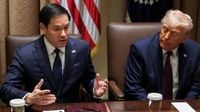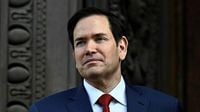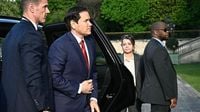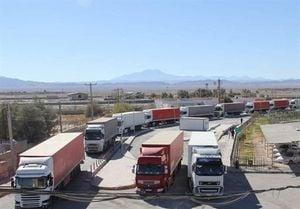In a striking shift in U.S. foreign policy, Secretary of State Marco Rubio has laid down an ultimatum regarding the ongoing peace negotiations between Russia and Ukraine, stating that the United States will reconsider its involvement if tangible results are not achieved soon. Speaking to reporters on Friday, April 18, 2025, following a round of talks in Paris, Rubio emphasized the urgency of the situation, declaring, "We need to figure out here, now within a matter of days, whether this is doable in the short term, because if it's not, then I think we're just going to move on." This statement marks a notable departure from the previous administration's more engaged approach to the conflict that has ravaged Ukraine since its inception.
Rubio's comments came after discussions with key European officials, including French President Emmanuel Macron, aimed at brokering a peace deal. He stressed that the U.S. has other priorities, asserting, "It’s not our war." This sentiment was echoed by President Donald Trump, who stated that the U.S. would make a decision on its involvement "very shortly." Trump’s remarks reflect a growing impatience within the administration regarding the lack of progress in negotiations, particularly from the Russian side.
In an attempt to apply pressure on Moscow, Rubio had a phone call with Russian Foreign Minister Sergey Lavrov the day before, where he expressed the need for a more decisive action from the Kremlin. However, Kremlin spokesman Dmitry Peskov responded by indicating that while some progress could be acknowledged, many complex discussions still lay ahead. He stated, "We believe that certain progress can, in fact, already be acknowledged," suggesting that Russia is not in a rush to finalize a peace agreement.
The backdrop to these developments includes a 30-day ceasefire that has recently expired, which was intended to halt strikes on energy infrastructure targets. Both Russia and Ukraine have accused each other of breaching the terms of this agreement. The lack of momentum in negotiations has led to increasing frustration among U.S. officials, particularly as the Kremlin has repeatedly sought relief from economic sanctions as a condition for making concessions.
As the situation unfolds, anticipation grows for a new round of talks scheduled to take place in London early next week. Rubio has indicated he may attend, but only if the meeting appears poised to yield meaningful outcomes rather than merely serving as another platform for dialogue. The Trump administration's ultimatum has raised concerns among analysts and observers, who fear that such threats could inadvertently embolden Russian intransigence. John Hardie, deputy director of the Foundation for Defense of Democracy's Russia Program, warned that threatening to withdraw from negotiations might lead Moscow to calculate that the U.S. walking away would result in diminished American support for Ukraine.
Meanwhile, the conflict has escalated on the ground, with Russia launching a missile attack on Kharkiv on the same day as Rubio's comments, resulting in one fatality and injuring 82 others, including children. This attack underscores the urgent need for a resolution to the conflict, as civilian casualties continue to mount amid the ongoing hostilities.
Looking back at Rubio's earlier foreign policy positions, it is evident that his current stance represents a significant evolution. In a 2013 speech, Rubio denounced isolationism and emphasized the importance of U.S. engagement in global affairs, arguing that a lack of American leadership would have dire consequences. He stated, "If America stops leading, who will fill the vacuum we leave behind?" This rhetoric starkly contrasts with his recent comments suggesting the U.S. might withdraw from negotiations if they do not yield quick results.
Rubio's transformation raises questions about the consistency of U.S. foreign policy under the current administration. Critics point out that the same individual who once championed humanitarian efforts, such as the PEPFAR program, now presides over significant cuts to USAID and other international aid programs. The contradiction between Rubio's past and present positions highlights the complexities of navigating foreign policy in an increasingly polarized political climate.
As the Trump administration grapples with the ongoing conflict in Ukraine, the stakes are higher than ever. With both sides entrenched in their positions and the humanitarian crisis deepening, the urgency for a diplomatic resolution cannot be overstated. The upcoming talks in London will be critical in determining whether a path forward can be forged or if the U.S. will indeed move on from what has become a protracted and devastating conflict.
In conclusion, the next few days will be pivotal as the U.S. reassesses its role in the Ukraine-Russia negotiations. With the potential for significant ramifications on both sides, the world watches closely to see if the Trump administration's ultimatum will spur meaningful action or simply lead to further entrenchment in a conflict that has already claimed countless lives.






